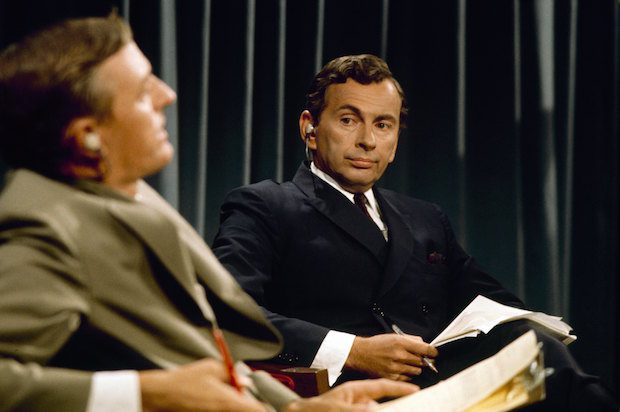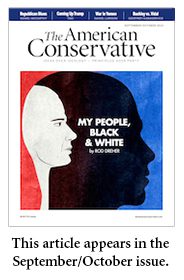Buckley Against Vidal

“Do you care to read the context or shall I cram it down your throat?”
— William F. Buckley Jr.
Context matters in the coruscating new documentary “Best of Enemies.” Why should today’s moviegoers care about a long-ago televised clash of political debaters? Because the debaters in question happened to be William F. Buckley Jr. and Gore Vidal, two of the most articulate intellectual exponents of the political right and left, and because their clash would have enduring repercussions for the combatants and, arguably, for the nature of media commentary ever since.
In the summer of 1968, ABC News, desperate to change its cellar-dwelling status in the television ratings, abandoned the time-honored format of continuous coverage of the Republican and Democratic presidential conventions. Instead, the network would air a nightly hour-and-a-half series of highlights anchored by a debate between opposing public intellectuals. ABC paid Buckley and Vidal $10,000 apiece to appear in 10 debates, split between the GOP convention in Miami Beach and the Democratic convention in Chicago.
In choosing Buckley and Vidal, ABC was aiming for maximal controversy. For one thing, the ideological distance between the two men was considerably greater than the distance between the two parties in those days. Buckley was the founder of the modern conservative movement, which regarded the Republican Party much as pirates would regard a merchant ship to be boarded, while the bestselling novelist Vidal by 1968 had come to identify with the radical left that viewed the Democratic Party as one more establishment to be overthrown. And both men, though they seldom met in person, loathed each other.
Vidal saw Buckley as an anti-democratic reactionary pushing the country toward destruction, a danger to the Republic whom Vidal had a responsibility to stop. Buckley for his part was appalled by Vidal. He wasn’t so much threatened by his debate partner’s open bisexuality—his wife’s best friends tended to be gay men—or Vidal’s extreme left-wing political positions, which he thought predictable. But Buckley viewed Vidal’s multimillion-selling novel Myra Breckenridge, with its transsexual heroine and celebration of polymorphic perversion, as genuinely corrosive. It was a “crazed” assault, he wrote, on “traditional, humane sexual morality: on the family as the matrix of society: on the survival of heroism, on the very idea of heroism.” Buckley considered Vidal “the devil,” in the words of Vidal’s biographer Fred Kaplan: “He represented everything that was going to moral hell, that was degenerative about the country.”
And yet, as the documentary emphasizes, both men were in many ways curiously alike. Both were wealthy, erudite, prep school trained and classically educated society fixtures with languid lockjaw accents, who seemed to embody the WASP upper class. Yet in fact both were outsiders and critics of that establishment—Buckley because of his conservatism and his father’s Texas frontier origins, Vidal because of his sexuality and iconoclastic instincts—in an era of centrist consensus.
Both men had political aspirations that were cut short when they ran up against more skillful establishment politicians. Buckley lost to liberal Republican John Lindsay in the 1965 New York City mayoral race, even though he pointed the way toward the GOP future by attracting angry white ethnics from the city’s outer boroughs. Vidal came from a distinguished Democratic political lineage—his grandfather was a senator from Oklahoma—and garnered his in-law John F. Kennedy’s endorsement in his 1960 New York congressional campaign. Unfortunately for his political career, he fell out with the Kennedy clan when he clashed with Bobby, whom he improbably regarded as a presidential rival.
Vidal’s 1960 play “The Best Man” (later made into a 1964 movie) epitomized the mid-century Democratic hope that the masses would recognize their proper ruler in a witty, progressive, Adlai Stevenson-esque patrician. (Similar liberal wish-fulfillment resurfaced decades later in the television miniseries “The West Wing,” and it must have been sweet vindication for Vidal when he was cast as a venerable Democratic senator in the 1992 film “Bob Roberts.”) As Buckley’s biographer Sam Tanenhaus observes in “The Best of Enemies,” Buckley and Vidal “were circling each other from very early on. Why? Partly because each one saw in the other a kind of exaggerated image of his own anxious version of himself.”
Buckley had told ABC that the one person he did not want to face on television in the 1968 debates was Gore Vidal. The reasons why quickly became apparent when Vidal attempted to take down Buckley, not only as a debater but as a human being. While Buckley spent the week before the debate sailing to Cozumel, Vidal hired a researcher in the hopes of painting Buckley’s magazine National Review as racist and anti-Semitic. Vidal even prepared zingers to use against Buckley that, the film reveals, he previewed with reporters. The debates between the two men had little to do with the issues that surfaced at the party conventions but rather boiled down to vicious and extremely personal exchanges.
The film heralds each round of debate with a bell and a title card, and the pugilistic intensity with which Buckley and Vidal went at each other is still mesmerizing even at a remove of almost half a century. Tanenhaus isn’t exaggerating when he calls Buckley the greatest debater and Vidal the greatest talker of their generation. Both made use of the full amplitude of the English language, and part of the pleasure of the film is hearing Vidal mocking his opponent’s “slightly Latinate and inaccurate style” and Buckley riposting “Such balderdash!” 
The debates also took place at a moment of high political drama, not long after the assassinations of Martin Luther King Jr. and Bobby Kennedy, with the Vietnam War raging, riots convulsing the nation’s cities, and Chicago’s police force gassing and clubbing demonstrators outside the Democratic convention. “Best of Enemies” makes good use of a host of talking heads who provide historical context, including the late Christopher Hitchens, Buckley’s younger brother Reid, and former TV host Dick Cavett. And, as several of the commentators observe, the issues fought out in the 1968 elections prefigured our present-day political divisions over sexual morality, race relations, crime, police violence, income inequality, and American imperialism.
The film does not, however, probe deeply into these matters. Neither did Buckley and Vidal in their debates, where they were more concerned with scoring points than learning anything from each other. Vidal scornfully dismissed Buckley’s suggestion that “freedom breeds inequality,” even though a similar proposition can be found in some of his own novels; Buckley attacked Vidal’s criticisms of the military campaign in Vietnam despite his own private reservations about the war. (“I am frankly delighted that you are 4F,” Buckley had written to a young friend in 1965, “inasmuch as I cannot see any purpose in joining the American Army at this moment. Some other war, perhaps.”) The filmmakers generally play fair with both sides, with the conspicuous exception of one scene that seems to show Buckley laughing gleefully over his alleged contributions to the persistence of racial segregation.
Tensions between the antagonists built up over the course of the conventions until finally erupting at the ninth debate, which took place after a night of clashes between police and protestors in Chicago. When Vidal compared Mayor Richard Daley’s city to a Soviet regime, Buckley objected to the attempt to “infer from individual and despicable acts of violence from Chicago policemen a case for implicit totalitarianism in the American system.” The discussion degenerated from there until Vidal lashed out at Buckley with the insult that “As far as I am concerned, the only sort of pro- or crypto-Nazi that I can think of is yourself.” ABC moderator Howard K. Smith stuttered out “Let’s—let’s not call names,” but too late:
Buckley: Now listen, you queer, stop calling me
a crypto-Nazi…Smith: Let’s stop… Let’s…
Buckley: …or I’ll sock you in the goddamn
face…Vidal: Oh, Bill, you’re so extraordinary!
Smith: Gentlemen, let’s stop calling names…
Buckley: …and you’ll stay plastered.
The filmmakers contend that the significance of the Buckley-Vidal flamewar is that it taught the networks to value supercharged ideological debate over straight news coverage. The Buckley-Vidal debates vaulted ABC over its rivals; no network carried gavel-to-gavel coverage of a political convention ever again. The winning formula, as Dick Cavett puts it in the film, became “Get Mr. Pro and Mr. Con, have them argue, and that’s enlightenment, that’s punditry.” There’s a straight line, in this view, from Buckley-Vidal to today’s cable news shoutfests.
But the would-be pundits we see on television now are dumber and duller than Buckley and Vidal ever were. They’re likelier to sprout wings than to invoke Pericles, as Vidal did in warning against the overextension of empire, or to flaunt whatever sesquipedalian vocabulary they might possess, as Buckley did at every opportunity.
Indeed, the Buckley-Vidal debate still seems unique for its sheer emotionalism and the odd quasi-sexual dynamics noticed by some contemporary observers. At one point Vidal referred to National Review as a magazine whose name would not pass his lips, to which Buckley responded, “We know that you like nothing to sully your lips.” “You will eat it first,” Vidal replied with a smirk. God knows what the 10 million viewers watching the debate made of that exchange. And Buckley’s infamous outburst was a rare televised example of loss of control, of the sort that some people seek out in auto races or certain types of pornography.
Buckley almost never lost his cool and rarely resorted to personal insult. In fact, he made very few permanent enemies; his geniality, like Ronald Reagan’s, was key to his political success. The debates haunted Buckley, and he even tendered Vidal an apology in a long essay he wrote about them, while Vidal reveled in having “left the bleeding corpse of William F. Buckley Jr. on the floor of a convention hall in Chicago” and mounted a photoset of the debates above his bathtub like a safari pelt. In the end, the episode on which “Best of Enemies” pivots was an anomaly in Buckley’s long career. It makes for compelling viewing, but ultimately it was a moment of sound and fury, signifying less than the filmmakers think.
Geoffrey Kabaservice is the author, most recently, of Rule and Ruin: The Downfall of Moderation and the Destruction of the Republican Party, From Eisenhower to the Tea Party.
Comments